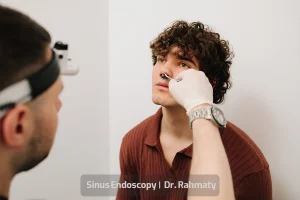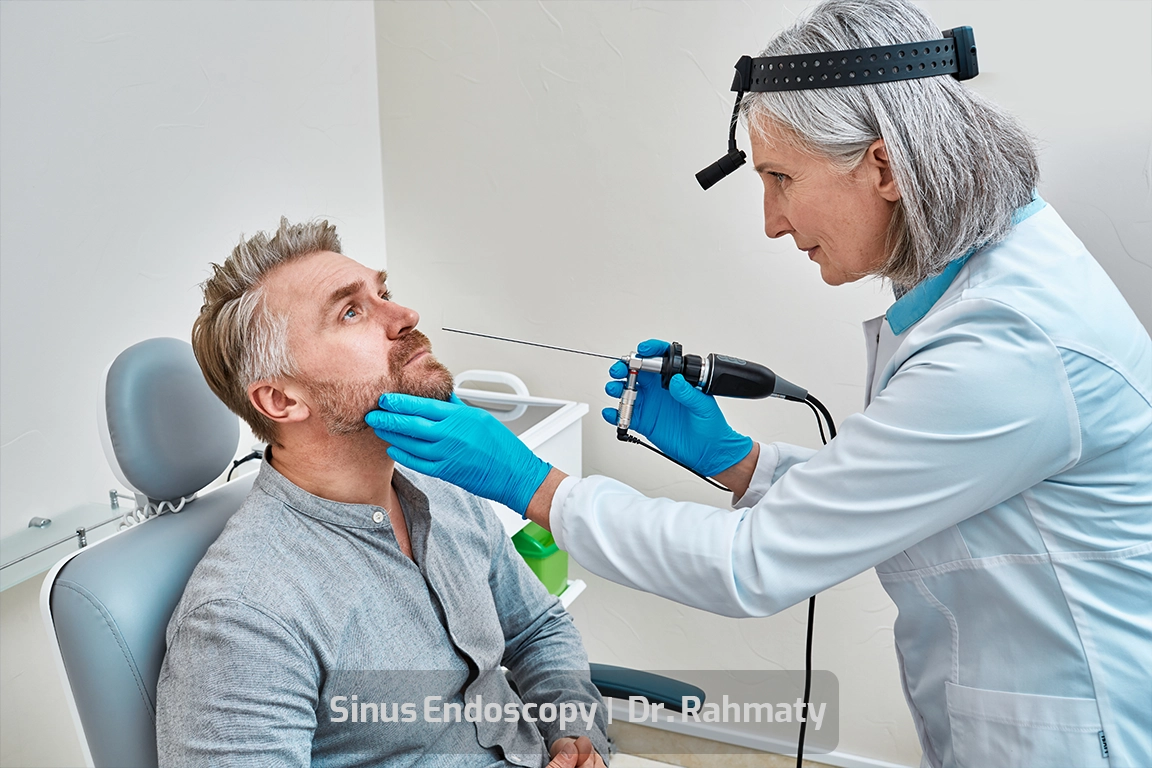Chronic Sinusitis and Endoscopic Sinus Surgery
One of the most widely used and significant solutions for chronic sinusitis in the medical field is sinus endoscopy, which can help drain nasal infections. Before anything else, it is important to understand that the skull and facial bones contain sinuses that are filled with air. Any factor that leads to the filling or blockage of these sinuses with mucus or pus is referred to as sinusitis.
This condition can manifest due to various factors such as the common cold, allergies, a deviated septum, and so on. It is also worth noting that mild fever, pain, nasal discharge, and throat drainage are common symptoms of this disease.

In this context, sinus endoscopy refers to a surgical procedure used to treat sinusitis. Gaining sufficient information about sinus endoscopy, either as general knowledge or as part of a treatment plan, is essential. We encourage you to continue reading for further details on sinus endoscopy.
What Type of Surgery is Sinus Endoscopy?
As mentioned earlier, one of the most common techniques for treating sinusitis is sinus endoscopy. In cases of mild sinus symptoms, it is essential to consult a doctor and undergo treatment promptly. Failure to seek medical attention and timely treatment may result in the condition worsening, turning into acute sinusitis, which is one of the signs of advanced sinusitis.
Generally, the goal of performing sinus endoscopy is to treat severe and acute sinusitis by draining infections from the nasal passages using advanced technological equipment. In the past, this procedure was conducted with great sensitivity, where damaged tissues were removed to open the drainage pathways for infections.
An otolaryngologist (ENT specialist) can easily view the inside of the sinuses using an endoscope and determine whether surgery is necessary. Therefore, if you suspect you may have this condition, it is crucial to visit a doctor for a proper examination and diagnosis.
Reasons for Sinus Endoscopy Surgery
As previously mentioned, the primary purpose of sinus endoscopy surgery is to drain infections and secretions inside the sinuses that block the airways. Additionally, sinus endoscopy can result in the following outcomes:
-
Treatment of chronic and severe sinusitis.
-
Improvement of the patient’s olfactory function.
-
Reduction in sinus discharge.
-
Lowering the risk of sinus-related diseases.
Advantages of Sinus Endoscopy Surgery
One of the significant benefits of sinus endoscopy surgery is that no incisions are made in the nose. This means the procedure is completed without leaving any visible scars or wounds, which is considered a major advantage of this technique.
-
The swelling and bruising are minimal due to the lack of incisions, and in some cases, there may be no visible signs of either.
-
Daily activities (within limits) can be resumed after the surgery.
-
The pain associated with the procedure is very mild and manageable.
-
The recovery period is short, and the healing process is notably rapid.
-
Post-surgery bleeding is usually minimal and limited.
Post-Operative Care After Sinus Endoscopy
Post-operative care is essential to aid recovery and minimize the risk of complications. Here are some key care guidelines following sinus endoscopy:
-
Rest and Self-Care
-
Initially, rest after the procedure is advised, and you should avoid heavy physical activities.
-
Refrain from strenuous activities, such as exercise, lifting heavy objects, or bending excessively, for 24 to 48 hours.
-
-
Care for the Surgical Site
-
Mild nasal bleeding may occur after sinus endoscopy, which is usually normal. However, if bleeding is severe or prolonged, consult a doctor.
-
Avoid touching or pressing on the nose and surgical areas.
-
-
Medication
-
Your doctor may prescribe antibiotics or pain relievers. Follow the prescribed regimen.
-
If taking painkillers, avoid using non-steroidal anti-inflammatory drugs (NSAIDs) such as ibuprofen for extended periods unless directed by the doctor.
-
-
Saline Spray or Nasal Irrigation
-
Your doctor may recommend a saline spray or nasal irrigation with a saline solution to reduce inflammation and clear the sinus passages.
-
This can help drain mucus and facilitate the healing process.
-
-
Environmental Considerations
-
After sinus endoscopy, avoid exposure to dry air or extremely cold temperatures. Using a humidifier in the environment may help.
-
Avoid exposure to cigarette smoke or harmful chemicals.
-
-
Proper Sleep Position
-
To prevent fluid accumulation and reduce pressure in the sinus area, it is best to elevate your head while sleeping (with extra pillows).
-
Sleep on your side or back, avoiding sleeping on your stomach.
-
-
Dietary Recommendations
-
Eating light, hydrating foods (plenty of water, warm soups, and fruits) is advised to reduce inflammation and speed recovery.
-
Avoid spicy or acidic foods, as they may irritate the sinus passages.
-
-
Avoiding Hot Steam Inhalation
-
Although hot steam may help relieve sinus pain and pressure, avoid inhaling hot steam or taking prolonged hot showers immediately after the procedure.
-
-
Consulting Your Doctor
-
If you experience symptoms such as fever, severe pain, abnormal swelling, or changes in vision, contact your doctor immediately.
-
For any concerns or questions, always consult with your doctor.
-
These guidelines will help facilitate a quicker recovery without complications.
Finally, it is important to remember that seeking medical attention promptly to prevent the worsening of this condition should be prioritized over the final treatment itself.
Additionally, Dr. Benyamin Rahmati, one of the renowned surgeons and specialists in the field of otolaryngology and head and neck surgery, offers various medical and aesthetic treatments in the city of Ark using the latest equipment and global techniques. It is also recommended to read the article on “Non-invasive Preservation Rhinoplasty” for further insights.




